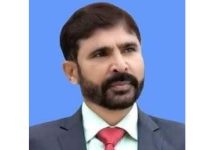by Muhammad Mohsin Iqbal
India’s involvement in covert operations and alleged terrorism-related activities beyond its borders has increasingly come under global scrutiny. Once considered a regional power primarily concerned with internal security challenges, India now finds itself accused of state-sponsored actions in foreign countries—actions that undermine international norms and threaten diplomatic relations. This growing narrative is no longer confined to adversarial states like Pakistan, but is now echoed by countries such as Canada and even the United States, raising legitimate concerns over the modus operandi of Indian intelligence services.
One of the earliest and most consistent accusations against India comes from Pakistan, which has repeatedly highlighted Indian involvement in terrorist activities on its soil. The most striking case was the arrest of Kulbhushan Jadhav, an Indian naval officer apprehended by Pakistan’s security forces on 3 March 2016 in Balochistan. Jadhav confessed to being an agent of the Indian intelligence agency RAW (Research and Analysis Wing) and to orchestrating subversive activities in Pakistan, particularly in Balochistan and Karachi. The Indian government initially denied his affiliation with RAW but later acknowledged his identity. The International Court of Justice (ICJ), while staying his execution, did not exonerate him, instead emphasizing the need for consular access and due process, confirming the legitimacy of Pakistan’s concerns.

Apart from Jadhav, Pakistan has on multiple occasions submitted dossiers to the United Nations and other international bodies, documenting India’s alleged sponsorship of terrorism. In November 2020, the Foreign Minister of Pakistan, alongside the Director General of Inter-Services Public Relations (ISPR), presented a detailed dossier containing audio, video and documentary evidence implicating India in sponsoring banned terrorist outfits such as the Tehreek-e-Taliban Pakistan (TTP) and Balochistan Liberation Army (BLA). The dossier also linked Indian consulates in Afghanistan with financial and logistical support for these groups.
What elevates these accusations to a global dimension is the revelation from Canada. On 18 September 2023, Canadian Prime Minister Justin Trudeau made an explosive statement in the House of Commons, alleging the involvement of Indian agents in the killing of Hardeep Singh Nijjar, a Canadian citizen and Sikh separatist leader who was shot dead on 18 June 2023 outside a Gurdwara in Surrey, British Columbia. Trudeau stated that there were “credible allegations” linking Indian government agents to the murder, prompting Canada to expel a senior Indian diplomat. India responded by expelling a Canadian diplomat in retaliation, but the damage to bilateral relations was significant. This marked the first time a Western democracy directly accused India of extrajudicial killings on foreign soil—a practice typically associated with authoritarian regimes.
The seriousness of the Canadian allegations was underlined when, on 29 November 2023, the U.S. Department of Justice unsealed an indictment against an Indian national named Nikhil Gupta for plotting the assassination of Gurpatwant Singh Pannun, another Sikh separatist and U.S. citizen. According to the indictment, Gupta was allegedly recruited by an Indian government employee to arrange the murder-for-hire of Pannun in New York. The U.S. authorities arrested Gupta in the Czech Republic, and the case provided damning insight into India’s alleged willingness to carry out extrajudicial killings overseas. The indictment cited encrypted communications, financial transactions, and other surveillance evidence indicating a direct link to Indian state actors.
These developments have prompted concerns even within India’s traditional allies. A report by The Washington Post on 1 December 2023 stated that multiple Western intelligence agencies were now reassessing India’s covert capabilities and intentions. The Guardian and BBC also reported that Five Eyes intelligence—a cooperation alliance among the US, UK, Canada, Australia, and New Zealand—had shared intelligence backing Canada’s claims, further legitimizing the accusations.
It is also important to highlight that India’s extraterritorial activities have drawn criticism from human rights organizations. Human Rights Watch and Amnesty International have both raised alarms over India’s pattern of targeting dissidents abroad, citing cases of digital surveillance, threats, and in some instances, mysterious disappearances or killings of expatriate critics of the Indian government.
Such actions by a democratic state raise serious questions about India’s adherence to international law and its role as a responsible global actor. They also have broader implications for the international order. If a state engages in the assassination of foreign citizens or dissidents in democratic countries, it sets a dangerous precedent and undermines global norms of sovereignty and the rule of law.
In the context of South Asia, these actions fuel instability and erode trust. In Pakistan, Indian-sponsored terrorism has been a long-standing issue. The 13 December 2014 Army Public School attack in Peshawar, where 149 people including 132 children were brutally murdered, was linked by Pakistani officials to groups allegedly supported by India through Afghan territory. While India has denied such involvement, Pakistan has repeatedly sought international inquiry and oversight into these links, including presenting evidence to the UN Secretary-General and the Organization of Islamic Cooperation (OIC).
The accumulation of such credible allegations from multiple countries, supported by intelligence sharing and legal indictments, reflects a troubling trend. A democratic state claiming to be the world’s largest democracy cannot afford to be seen as a sponsor of terrorism or extrajudicial killings. These revelations must prompt an international call for accountability and transparency. If substantiated, India must be held to the same standard as any other state violating international laws and norms. The world cannot afford selective justice when it comes to state-sponsored violence.

















